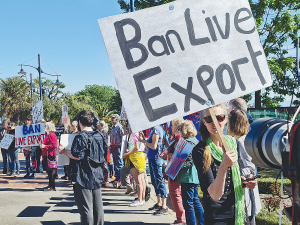Full cabinet
OPINION: Legislation being drafted to bring back the controversial trade of live animal exports by sea is getting stuck in the cogs of Cabinet.
 Veterinarians for Animal Welfare Aotearoa managing director Dr Helen Beattie says the end of live exports by sea could mark a 'new dawn' for animal welfare.
Veterinarians for Animal Welfare Aotearoa managing director Dr Helen Beattie says the end of live exports by sea could mark a 'new dawn' for animal welfare.
The end of live exports by sea could mark a ‘new dawn’ for animal welfare, both in New Zealand and across the globe.
That’s according to Veterinarians for Animal Welfare Aotearoa (VAWA) managing director Dr Helen Beattie.
The last live export ship left New Zealand last month and Beattie says the decision to ban livestock exports by sea, which takes effect today, is a testament to New Zealand’s commitment to animal welfare.
“This monumental move elevates the country’s status as a global leader in animal welfare and sets a precedent for other nations to follow,” she says. “In addition to the animal welfare benefits, there are environmental benefits through reduced use of fossil energy in shipping and less effluent being washed directly into the ocean.”
She says the ban could serve as a catalyst for other countries.
“For example, we are pleased to see the Australian Government moving to ban the live export of sheep by sea - this is a step in the right direction and hopefully a move towards a wider ban. We invite other governments to evaluate their animal welfare policies and to progress reforms to improve the lives of animals in their care.”
Beattie says the ban is a ‘powerful statement’ against what she says are inhumane practices that impact animals.
She adds that it reaffirms New Zealand’s commitment to prioritising animal welfare and sends a message that the suffering of animals is not an acceptable cost of doing business.
“By eliminating this ‘export segment of suffering’ that has financially benefited only a few, a beacon is lit that can fuel further progress for animal welfare, both locally and globally. This could change the lives of billions of animals for the better.”
The Meat Industry Association of New Zealand (MIA) today announced that Chief Executive Officer Sirma Karapeeva has resigned from the role.
The winners of the 2026 Hawke’s Bay/Wairarapa Dairy Industry Awards were announced at the annual awards dinner held at Copthorne Solway Park in Masterton on Thursday evening.
Environment Southland is welcoming this week’s decision by the Environmental Protection Authority (EPA) to approve the release of Blaptea elguetai, a leaf‑feeding beetle that will help control the highly invasive Chilean flame creeper.
This March, the potato industry is proudly celebrating International Women’s Day on 8 March alongside the International Year of the Woman Farmer, recognising the vital role women play across every part of the sector — from paddocks and packhouses to research, leadership, and innovation.
Fruit trader Seeka posted a record profit and returns to shareholders in 2025.
Recent weather events in the Bay of Plenty, Gisborne/Tairawhiti, and Canterbury have been declared a medium-scale adverse event.